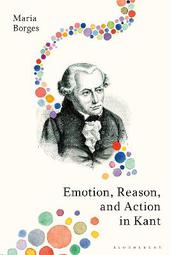
|
Emotion, Reason, and Action in Kant
Hardback
Main Details
| Title |
Emotion, Reason, and Action in Kant
|
| Authors and Contributors |
By (author) Dr Maria Borges
|
| Physical Properties |
| Format:Hardback | | Pages:224 | | Dimensions(mm): Height 234,Width 156 |
|
| Category/Genre | Philosophy
Western philosophy - c 1600 to c 1900
Ethics and moral philosophy |
|---|
| ISBN/Barcode |
9781350078369
|
| Classifications | Dewey:128.092 |
|---|
| Audience | | Tertiary Education (US: College) | |
|---|
|
Publishing Details |
| Publisher |
Bloomsbury Publishing PLC
|
| Imprint |
Bloomsbury Academic
|
| Publication Date |
18 April 2019 |
| Publication Country |
United Kingdom
|
Description
This book is open access and available on www.bloomsburycollections.com. It is funded by Knowledge Unlatched. Though Kant never used the word 'emotion' in his writings, it is of vital significance to understanding his philosophy. This book offers a captivating argument for reading Kant considering the importance of emotion, taking into account its many manifestations in his work including affect and passion. Emotion, Reason, and Action in Kant explores how, in Kant's world view, our actions are informed, contextualized and dependent on the tension between emotion and reason. On the one hand, there are positive moral emotions that can and should be cultivated. On the other hand, affects and passions are considered illnesses of the mind, in that they lead to the weakness of the will, in the case of affects, and evil, in the case of passions. Seeing the role of these emotions enriches our understanding of Kant's moral theory. Exploring the full range of negative and positive emotions in Kant's work, including anger, compassion and sympathy, as well as moral feeling, Borges shows how Kant's theory of emotion includes both physiological and cognitive aspects. This is an important new contribution to Kant Studies, suitable for students of Kant, ethics, and moral psychology.
Author Biography
Maria Borges is Professor of Philosophy at the University of Santa Catarina, Brazil.
ReviewsEnglish-language readers now have the opportunity to learn about Brazilian philosopher Maria Borges's groundbreaking work on Kant and the emotions. In Emotion, Reason and Action in Kant - her first book in English - she expands and deepens her investigations into an underexplored side of Kant that is unfortunately still foreign territory for many of Kant's friends as well as foes. * Robert B. Louden, Distinguished Professor and Professor of Philosophy, University of Southern Maine, USA * Among the recently increasing number of works on Kant on emotion, Borges's book is the most wide-ranging and insightful yet. Drawing on the full range of Kant's work in moral philosophy, anthropology, and aesthetics, she brings out the complexity of Kant's conception of what we now call the emotions and of the relation between his view of the emotions and his transcendental idealist theory of free will. A bonus is her demonstration that in spite of well-taken feminist critiques of Kant, he also allotted an indispensable role to women in the moral education of humankind at large. Borges convincingly argues that Kant made enduring contributions to our understanding of the nature and importance of human emotions. * Paul Guyer, Jonathan Nelson Professor of Humanities and Philosophy, Brown University, USA * Wide-ranging in topics and scholarship, Emotion, Reason and Action in Kant develops Maria Borges's initially shocking claim that we can learn something about the emotions from Kant. Since, as she argues, any adequate account of Kant's moral psychology must include his views about the roles of different emotions in moral life, Borges's book will be valuable to many. * Patricia Kitcher, Roberta and William Campbell Professor of Humanities, Columbia University, USA *
|